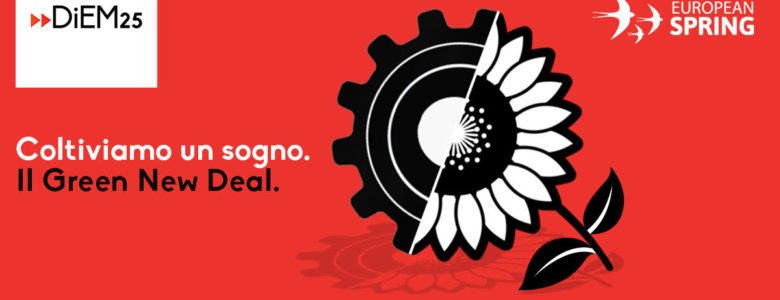
IL NOSTRO GREEN NEW DEAL
Il nostro programma per un’Europa verde, giusta, solidale e femminista è disponibile in italiano: scopri il Green New Deal cliccando su questo link!
GreenNewDeal Programma ITA

DIEM25: ELETTE ED ELETTI DI NC, CC E ALA ELETTORALE
Settembre comincia con il totale rinnovo del Collettivo Nazionale, dell’Ala Elettorale e del Coordinamento Collettivo Europeo. Ecco tutti i risultati!
IL NUOVO COLLETTIVO NAZIONALE ITALIANO
Dal 26 luglio sono stati eletti i 12 nuovi membri del Coordinamento Nazionale italiano, 10 donne e 2 uomini:
AGENDA: Alessandra Rossi (42%); Paola Banovaz (38%); Andrea Serra (35%) mentre tra i non eletti Raniero Bordon (34%), Stefano Lotti (33%) e Massimiliano Civili (19%)
COMUNICAZIONE: Patrizia Pozzo (48%); Martina Tarozzi (43%), Fabrizia Biondi (43%) mentre tra i non eletti Kosta Juri (33%), Ivan Alberto larosi (19%), Giuseppe Schermi (11%), Ferdinando Manzo (10%)
TERRITORIO: Stefania Romano (41%), Maria D’Onofrio (37%), Antonella Trocino (36%) mentre tra i non eletti Simone Careddu (33%), Angelo Amoroso D’Aragona (22%), Alessandro Seri (19%), Giampaolo Samblich (11%)
EVENTI: Giovanna Saboureault (45%), Claudia Cagnarini (42%), Enrico Caccin (35%) mentre tra i non eletti Edoardo scatto (35%) e Massimo Carola (18%)
LA NUOVA ALA ELETTORALE ITALIANA
Dal 29 agosto è ufficialmente eletta la nuova Ala Elettorale:
Paola Pietrandrea (54%), Eleonora Vasques ( 50%), Simona Ferlini (47%), Paola Urbinati (43%), Michele Fiorillo (40%). Veralisa Massari ( 39%), Alessandra Fata ( 33%), Vincenzo Fiore (32%), Giovanna Saboreault (31%), Paola Banovaz (29%), Stefano Spivach (29%), Piera Stefanini (29%), Paola Bristot (26%), Angelo Amoroso D’Aragona (26%), Stefano Lotti (25%).
A seguire ecco l’elenco dei candidati non eletti: Giuseppe Schermi (25%), Andrea Bellavite (23%), Alessandro Seri (21%), Lodovico Rella (21%),Matteo Contini (20%), Alessandro Scalise (20%), Ivan Alberto Larosi (19%), Agata Spallino (17%), Roberto Angrisani (15%), Antonio Zucaro (15%), Nicola Ricci (15%), Carlo Fontana (12%), Jacopo Tolija (11%), Giampaolo Sablich (8%)
IL NUOVO COORDINAMENTO COLLETTIVO
E infine ecco i risultati delle elezione per il Collettivo di Coordinamento Europeo:
Yanis Varoufakis (78%), Srecko Horvat (53%), Gianna Merki (37%), Simona Ferlini (35%), Erik Erdman (33%), Daniela Platsch (32%), Ivana Nenadovic (32%), Renata Avila (31%), Sissy Velissariou (31%), Agnieszka Dziemianowicz (30%), Mame Faye-Rexhepi (30%), Jordi Ayala Roqueta (29%).
Tra i non eletti: Costanza Sciubba Caniglia (29%), Rosanna Martens (27%), Fotini Bakadima (25%), Dolores Bajo Alonso (25%), Silvia Terribili (23%), Andrea Pisauro (22%), Jacques Terrenoire (22%), Eírini Mítsiou (21%), Eleonora Vasques (21%), Pawel Wargan (21%), Nikos Vakolidis (20%), Michele Fiorillo (20%), Nicolas Dessaux (19%), Brice Montagne (18%), Jochen (Joachim Hermann Leopold) Schult (17%), Rodanthi Aristea Bairaktari (17%), Aleksandar Novaković (14%), Germinal Pinalie (14%), Ioannis Manomenidis (13%), Christos Dellasoudas, Georgios Gokas (11%), Dimitris Gkomozias (10%).
Il lavoro da fare in Italia e in Europa è tanto, dunque … carpe diem!